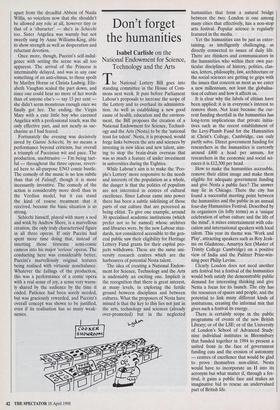Don't forget the humanities
Isabel Carlisle on the National Endowment for Science, Technology and the Arts
The National Lottery Bill goes into standing committee in the House of Com- mons next week. It puts before Parliament Labour's proposals to increase the scope of the Lottery and to overhaul its administra- tion. As well as establishing a new good cause of health, education and the environ- ment, the Bill proposes the creation of a National Endowment for Science, Technol- ogy and the Arts (Nesta) to be the 'national trust for talent'. Nesta, it is proposed, would forge links between the arts and sciences by investing in new ideas and new talent, aim- ing to stop the brain-drain overseas that was so much a feature of under investment in universities during the Eighties.
While Labour's aim is to make the 'Peo- ple's Lottery' more responsive to the needs and interests of the population as a whole, the danger is that the politics of populism are not interested in centres of cultural excellence. Since Labour came into power there has been a subtle sidelining of those parts of our culture that are perceived as being elitist. To give one example, around 30 specialised academic institutions (which prefer not to be named) whose archives and libraries were, by the new Labour stan- dards, not considered accessible to the gen- eral public saw their eligibility for Heritage Lottery Fund grants for their capital pro- jects withdrawn. These are the same uni- versity research centres which are the harbourers of potential Nesta talent.
The idea of creating a National Endow- ment for Science, Technology and the Arts is undeniably an exciting one. Implicit is the recognition that there is great interest, at many levels, in exploring the fertile ground between disciplines and between cultures. What the proposers of Nesta have missed is that the key to this lies not just in the arts, technology and sciences (already over-promoted) but in the neglected humanities that form a natural bridge between the two. London is one among many cities that effectively, has a non-stop arts festival. Popular science is regularly featured in the media.
Yet the humanities can be just as enter- taining, as intelligently challenging, as directly connected to issues of daily life. There are thinkers and communicators in the humanities who within their own par- ticular disciplines of history, politics, clas- sics, letters, philosophy, law, architecture or the social sciences are getting to grips with the issues that concern us most as we enter a new millennium, not least the globalisa- tion of culture and how it affects us.
It is clear why the labels of elitism have been applied; it is in everyone's interest to remove them. Not least because the cur- rent funding shortfall in the humanities has long-term implications that private initia- tives such as the recent establishment of the Levy-Plumb Fund for the Humanities at Christ's College, Cambridge, can only partly solve. Direct government funding for researchers in the humanities is currently around £400 a head per annum, for researchers in the economic and social sci- ences it is £12,300 per head.
How to make the humanities accessible, remove their elitist image and make them eligible for adequate government funding and give Nesta a public face? The answer may lie in Chicago. There the city has found a successful meeting point between the humanities and the public in an annual four-day Humanities Festival. Described by its organisers (in lofty terms) as a 'unique celebration of urban culture and the life of the mind', it mixes entertainment with edu- cation and international speakers with local talent. This year its theme was 'Work and Play', attracting speakers such as Roy Jenk- ins on Gladstone, Amartya Sen (Master of Trinity College Cambridge) on a positive view of India and the Pulitzer Prize-win- ning poet Philip Levine.
Clearly London does not need another arts festival but a festival of the humanities would both satisfy the demonstrable public demand for interesting thinking and give Nesta a focus for its launch. The city has the resources of spaces and people, and the potential to link many different kinds of institutions, creating the informal mix that gives such a festival its energy.
There is certainly scope in the public programme of events of the new British Library; or of the LSE; or of the University of London's School of Advanced Study: nine individual institutes in Bloomsbury that banded together in 1994 to present a united front in the face of government funding cuts and the erosion of autonomy — centres of excellence that would be glad to prove themselves non-elitist. Nesta would have to incorporate an H into its acronym but what matter if, through a fes- tival, it gains a public face and makes an imaginative bid to rescue an undervalued part of British life.


























































 Previous page
Previous page